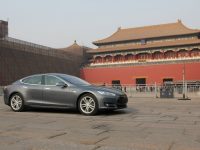Memo #306
By Marc McCrum – mbmccrum [at] alumni.ubc.ca and Grégoire-François Legault – gregoire.legault [at] alumni.ubc.ca

 According to the World Bank, Beijing’s poor air quality costs $300bn a year in healthcare costs and premature deaths. Of Beijing’s air pollution, over 30% is estimated to be the direct result of vehicle exhaust. In September 2013, as part of its five-year plan to address the city’s chronic air pollution, the government of Beijing put forward a plan to have 200,000 clean energy vehicles roaming the city’s streets by 2017. Realization of this target however, remains a long way off; by the end of 2013, fewer than 50,000 electric vehicles (EVs) were being driven nationwide. Of these, less than 1,000 were privately owned cars.
According to the World Bank, Beijing’s poor air quality costs $300bn a year in healthcare costs and premature deaths. Of Beijing’s air pollution, over 30% is estimated to be the direct result of vehicle exhaust. In September 2013, as part of its five-year plan to address the city’s chronic air pollution, the government of Beijing put forward a plan to have 200,000 clean energy vehicles roaming the city’s streets by 2017. Realization of this target however, remains a long way off; by the end of 2013, fewer than 50,000 electric vehicles (EVs) were being driven nationwide. Of these, less than 1,000 were privately owned cars.
Beijingers are already well aware of the functionality of electric vehicles. From electric scooters to public buses, taxis and three-wheeled delivery bikes, EVs are a common sight on the city’s roadways. What differentiates these EVs from privately owned electric cars is their access to charging posts. Outside municipal parking depots and company garages, charging infrastructure remains woefully underdeveloped. Another key disincentive is vehicle cost, with the premium associated with EVs remaining unpalatable for most households.
To increase electric car ownership, the Beijing government will need to enact policies and promote companies that assuage reliability concerns while increasing the desirability of EV ownership. A three-pronged approach could support EVs at low-end, mid-range and luxury price points. Homegrown upstarts like the electric car manufacturer Kandi, and its “vending machine” pay-to-use concept, have the potential to dramatically change car ownership patterns. The Chinese car manufacturer BYD, which recently announced a partnership with Daimler, is well positioned to cater to the mid-tier market. Luxury brand EVs, although out of reach for all but Beijing’s most wealthy, could raise the EV profile and change the perception of alternative energy vehicles by appealing to buyers whose concerns go beyond pure functionality. Foreign companies like Tesla, which have demonstrated the capacity and willingness to expand charging infrastructure throughout the country, should also qualify for the same subsidies and purchase incentives given to domestic carmakers.
Although difficult, increasing the private ownership of EVs in China is not an impossible task. Through a concerted policy and public relations efforts, China can capture an important segment of the burgeoning EV market at home and abroad while Beijing can clean up its reputation as one of the world’s most polluted cities.
About the Authors:
Marc McCrum is a Master in Asia Pacific Policy Studies candidate at the University of British Columbia and a Research Assistant in the Sauder School of Business. He is currently working at the Asia Pacific Foundation of Canada. You can connect with him on Linkedin.
Grégoire Legault is a Master in Asia Pacific Policy Studies candidate at the University of British Columbia and a Research Assistant in the Centre for Chinese Research. He has also contributed Memo #244,Memo #257, Memo #267 and Memo #289. You can follow him on Twitter, connect with him on Linkedin or visit his photo blog.
- A panorama of Lanzhou in China’s Gansu province; Beijing is not the only Chinese city that could benefit from increased electric car use (Credit Grégoire-François Legault).
- A Tesla electric car in front of Beijing’s Forbidden City (Credit: Tesla).
- Links:
- “Beijing Auto-License Lottery Sees Few Electric-Car Takers,” Bloomberg, February 2014
- “China’s Round Two on Electric Cars: Will It Work?” The Diplomat, April 2014
- “Beijing to Speed Up Construction of Changing Stations, Putting Electric Cars in Motion,” China News, June 2014 (in Chinese)
- Xingping Zhang, “The Current Dilemma and Future Path of China’s Electric Vehicles,” Sustainability 6:3, 2014
Related Memos:
See our other memos on China.


Comments are closed, but trackbacks and pingbacks are open.